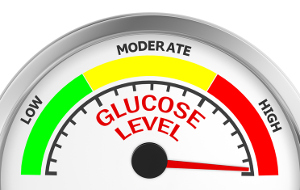 Inflammation appears to be a key factor in the majority of chronic illnesses such as e.g. rheumatism, type-2 diabetes, and cancer. Science has primarily focused on EPA (eicosapentaenoic acid), but new research points to supplementation with DHA (docosahexaenoic acid) as being even more effective in healthy patients with too much abdominal fat and subclinical systemic inflammation.
Inflammation appears to be a key factor in the majority of chronic illnesses such as e.g. rheumatism, type-2 diabetes, and cancer. Science has primarily focused on EPA (eicosapentaenoic acid), but new research points to supplementation with DHA (docosahexaenoic acid) as being even more effective in healthy patients with too much abdominal fat and subclinical systemic inflammation.
 If you find it difficult to control your desire for chocolate, candy, cake, soft beverages, and stimulants in general, and if you struggle with tiredness, overweight, and other problems related to unstable blood sugar, you will be pleased to learn that Danish researchers have revealed that a hormone produced by the liver controls our desire for sweets and stimulants. The scientists therefore see a potential in developing a new type of medicine that can control the need for sugar. However, it is also possible to control your sugar cravings by means of simple dietary changes combined with supplements of chromium, a mineral that increases insulin sensitivity.
If you find it difficult to control your desire for chocolate, candy, cake, soft beverages, and stimulants in general, and if you struggle with tiredness, overweight, and other problems related to unstable blood sugar, you will be pleased to learn that Danish researchers have revealed that a hormone produced by the liver controls our desire for sweets and stimulants. The scientists therefore see a potential in developing a new type of medicine that can control the need for sugar. However, it is also possible to control your sugar cravings by means of simple dietary changes combined with supplements of chromium, a mineral that increases insulin sensitivity.
- increasing your risk of pancreatitis and other complications
 A new American study shows that chronic alcohol abuse impairs the ability of the pancreas to absorb vitamin C, and that increases the risk of infection of the pancreas (pancreatitis) and other diseases. Lack of certain B vitamins may also damage the pancreas and increase the risk of encephalitis.
A new American study shows that chronic alcohol abuse impairs the ability of the pancreas to absorb vitamin C, and that increases the risk of infection of the pancreas (pancreatitis) and other diseases. Lack of certain B vitamins may also damage the pancreas and increase the risk of encephalitis.
 After giving birth, the mother’s adaptability and resources are put to the test. Also, the mother’s “baby brain” tends to take over. Unfortunately, many new mothers get the baby blues, and around 10 percent develop an actual postpartum depression that requires immediate attention. It is important to focus on the underlying causes that include the course of the delivery plus hormonal, biological, social, and emotional changes.
After giving birth, the mother’s adaptability and resources are put to the test. Also, the mother’s “baby brain” tends to take over. Unfortunately, many new mothers get the baby blues, and around 10 percent develop an actual postpartum depression that requires immediate attention. It is important to focus on the underlying causes that include the course of the delivery plus hormonal, biological, social, and emotional changes.
 Type 2 diabetes is spreading like a bushfire. An alarmingly many people have metabolic syndrome – or pre-diabetes – which is characterized by insulin resistance, hypertension, elevated cholesterol levels and abdominal obesity (apple-shaped body). Type 2 diabetes and metabolic syndrome are associated with enormous human and socio-economic costs. In this article, we will look closer at chromium, vitamin D, magnesium, and coenzyme Q10 plus relevant diet changes to see how they can positively affect blood sugar levels, cholesterol balance, and weight control. We will also take a closer look at supplements that are able to prevent diabetic neuropathy, a disorder that can lead to amputations.
Type 2 diabetes is spreading like a bushfire. An alarmingly many people have metabolic syndrome – or pre-diabetes – which is characterized by insulin resistance, hypertension, elevated cholesterol levels and abdominal obesity (apple-shaped body). Type 2 diabetes and metabolic syndrome are associated with enormous human and socio-economic costs. In this article, we will look closer at chromium, vitamin D, magnesium, and coenzyme Q10 plus relevant diet changes to see how they can positively affect blood sugar levels, cholesterol balance, and weight control. We will also take a closer look at supplements that are able to prevent diabetic neuropathy, a disorder that can lead to amputations.
- but are all those dairy products really necessary?
 Eating breakfast has a positive effect on cognitive skills such as memory and learning in children and teenagers, according to an article about Danes and their breakfast habits that is published in Nutrients. However, many children are delivered in their institutions early in the morning, in some cases without even having had a chance to eat breakfast. The Danish Veterinary and Food Administration therefore recommends offering these children the chance of eating breakfast in their institutions. It seems that symptoms such as poor concentration, hyperactivity, and apathy, which tend to be viewed as psychological problems, are often the result of not eating breakfast, having low blood sugar levels, and lacking essential vitamins, minerals, and essential fatty acids. In the following, you can read more about the value of eating a healthy breakfast, while you can find out more about the low-fat dairy products that actually increase your risk of unstable blood sugar and overweight.
Eating breakfast has a positive effect on cognitive skills such as memory and learning in children and teenagers, according to an article about Danes and their breakfast habits that is published in Nutrients. However, many children are delivered in their institutions early in the morning, in some cases without even having had a chance to eat breakfast. The Danish Veterinary and Food Administration therefore recommends offering these children the chance of eating breakfast in their institutions. It seems that symptoms such as poor concentration, hyperactivity, and apathy, which tend to be viewed as psychological problems, are often the result of not eating breakfast, having low blood sugar levels, and lacking essential vitamins, minerals, and essential fatty acids. In the following, you can read more about the value of eating a healthy breakfast, while you can find out more about the low-fat dairy products that actually increase your risk of unstable blood sugar and overweight.
 Researchers from Sweden and England have discovered a link between vitamin A and diabetes. According to their new study, vitamin A is essential for enabling pancreatic beta cells to produce insulin, the hormone that helps cells take up sugar. This discovery could open new doors to better diabetes therapies in the future. However, it is also important to focus on diet, weight management, and the intake of other nutrients like chromium for proper blood sugar control, which is necessary for preventing and treating diabetes.
Researchers from Sweden and England have discovered a link between vitamin A and diabetes. According to their new study, vitamin A is essential for enabling pancreatic beta cells to produce insulin, the hormone that helps cells take up sugar. This discovery could open new doors to better diabetes therapies in the future. However, it is also important to focus on diet, weight management, and the intake of other nutrients like chromium for proper blood sugar control, which is necessary for preventing and treating diabetes.
 Chromium is primarily known for its role in insulin utilization and blood sugar control. However, chromium is also important for macronutrient metabolism and the circulatory system. Chromium’s role in health has been debated and a group of scientists have looked closer at the link between low blood levels of chromium and global health burdens such as cardiovascular disease, type 2 diabetes, and depression. How do we get enough chromium from the diet and what supplements have the highest bioavailability?
Chromium is primarily known for its role in insulin utilization and blood sugar control. However, chromium is also important for macronutrient metabolism and the circulatory system. Chromium’s role in health has been debated and a group of scientists have looked closer at the link between low blood levels of chromium and global health burdens such as cardiovascular disease, type 2 diabetes, and depression. How do we get enough chromium from the diet and what supplements have the highest bioavailability?
 The mineral chromium is found in various forms. Hexavalent chromium is used for industrial purposes such as chrome plating, tanning of hides, dyes, wood protection etc. This form of chromium is toxic and may cause contact dermatitis and certain cancer forms. Trivalent chromium, on the other hand, is found in biological matter such as plants and animals and is an essential nutrient. As the body's need for chromium is rather small, this nutrient is characterised as a trace element. The body stores around 4-6 mg of chromium.
The mineral chromium is found in various forms. Hexavalent chromium is used for industrial purposes such as chrome plating, tanning of hides, dyes, wood protection etc. This form of chromium is toxic and may cause contact dermatitis and certain cancer forms. Trivalent chromium, on the other hand, is found in biological matter such as plants and animals and is an essential nutrient. As the body's need for chromium is rather small, this nutrient is characterised as a trace element. The body stores around 4-6 mg of chromium.
 Type 2 diabetes is spreading like a bushfire and even more people suffer from something called metabolic syndrome, a prediabetic stage characterized by insulin resistance, hypertension, elevated cholesterol, and apple-shaped figure caused by a blood sugar imbalance. Chromium supplementation helps improve insulin sensitivity and lowers weight and blood pressure, thereby reducing the risk of cardiovascular disease, according to a placebo-controlled study that is published in the journal Biological Trace Element Research. It is advisable to lower your carbohydrate intake and to choose a chromium supplement with good bioavailability.
Type 2 diabetes is spreading like a bushfire and even more people suffer from something called metabolic syndrome, a prediabetic stage characterized by insulin resistance, hypertension, elevated cholesterol, and apple-shaped figure caused by a blood sugar imbalance. Chromium supplementation helps improve insulin sensitivity and lowers weight and blood pressure, thereby reducing the risk of cardiovascular disease, according to a placebo-controlled study that is published in the journal Biological Trace Element Research. It is advisable to lower your carbohydrate intake and to choose a chromium supplement with good bioavailability.
 Do you feel an insatiable desire for sweets all the time? Do you find yourself snacking in between meals? A simple think like a daily chromium supplement may resolve your problem and even help you lose weight.
Do you feel an insatiable desire for sweets all the time? Do you find yourself snacking in between meals? A simple think like a daily chromium supplement may resolve your problem and even help you lose weight.
If you are typ e-2 diabetic, you may find that taking a daily supplement of organic chromium yeast can help you cope with your condition.
e-2 diabetic, you may find that taking a daily supplement of organic chromium yeast can help you cope with your condition.
 The trace element chromium improves the effect of insulin, the hormone that helps glucose enter our cells. Chromium is needed for normal sugar metabolism that is closely linked to normal lipid metabolism and weight control. According to a new study of rodents, a chromium-deficient diet that is rich in carbohydrate and fat, increases hunger and energy intake. Also, levels of insulin and lipids in the blood increase, and there is weight gain and an increased risk of developing type 2 diabetes. The new study supports earlier studies of humans where it was seen that chromium is important for both blood sugar levels and weight control. When using chromium supplements, make sure to choose a product with chromium yeast that has good absorption. Also make sure to get plenty of protein that contributes to blood sugar management and fat burning, which makes it easier to lose weight.
The trace element chromium improves the effect of insulin, the hormone that helps glucose enter our cells. Chromium is needed for normal sugar metabolism that is closely linked to normal lipid metabolism and weight control. According to a new study of rodents, a chromium-deficient diet that is rich in carbohydrate and fat, increases hunger and energy intake. Also, levels of insulin and lipids in the blood increase, and there is weight gain and an increased risk of developing type 2 diabetes. The new study supports earlier studies of humans where it was seen that chromium is important for both blood sugar levels and weight control. When using chromium supplements, make sure to choose a product with chromium yeast that has good absorption. Also make sure to get plenty of protein that contributes to blood sugar management and fat burning, which makes it easier to lose weight.
 The brain normally only uses blood sugar in the form of glucose. However, people suffering from insulin resistance have impaired cellular uptake of blood sugar, causing an energy shortage of the brain. According to a recent Israeli study, insulin resistance may speed up impairment of the cognitive functions that include the ability to think, speak, and solve problems. Because insulin resistance is an early stage of type-2 diabetes that spreads like an epidemic, there is every reason in the world to start preventing or treating this condition. A few dietary adjustments combined with a blood sugar-regulating trace element may do the trick.
The brain normally only uses blood sugar in the form of glucose. However, people suffering from insulin resistance have impaired cellular uptake of blood sugar, causing an energy shortage of the brain. According to a recent Israeli study, insulin resistance may speed up impairment of the cognitive functions that include the ability to think, speak, and solve problems. Because insulin resistance is an early stage of type-2 diabetes that spreads like an epidemic, there is every reason in the world to start preventing or treating this condition. A few dietary adjustments combined with a blood sugar-regulating trace element may do the trick.
A variety of common health problems are linked to low levels of the “sunshine vitamin”. Are you getting enough of this vital nutrient?
 Each Dane consumes 12.3 kilos of candy on average every single year, which makes Denmark the single largest candy eaters worldwide, according to Euromonitor that has studied candy consumption in 100 different countries. This rather unhealthy champion status has a number of grave health consequences, as it affects our blood sugar levels, energy levels, and ability to concentrate. In the long run, it may lead to dependence on these quick “energy fixes” and contribute to problems with the immune system, insulin resistance, overweight, diabetes, digestive disorders and other lifestyle diseases. To make things worse, there is all the concealed sugar that we get from our diet. A new science project aims at developing methods for helping families improve their daily health. In the following, you can read more about the dangers of consuming too much sugar and what you can do to stabilize your blood sugar by distributing your energy intake and taking a supplement of the trace element chromium.
Each Dane consumes 12.3 kilos of candy on average every single year, which makes Denmark the single largest candy eaters worldwide, according to Euromonitor that has studied candy consumption in 100 different countries. This rather unhealthy champion status has a number of grave health consequences, as it affects our blood sugar levels, energy levels, and ability to concentrate. In the long run, it may lead to dependence on these quick “energy fixes” and contribute to problems with the immune system, insulin resistance, overweight, diabetes, digestive disorders and other lifestyle diseases. To make things worse, there is all the concealed sugar that we get from our diet. A new science project aims at developing methods for helping families improve their daily health. In the following, you can read more about the dangers of consuming too much sugar and what you can do to stabilize your blood sugar by distributing your energy intake and taking a supplement of the trace element chromium.
- and cause serious physical and psychological disease
 Type 2 diabetes is spreading like a bushfire, and taking the diabetes drug metformin increases the risk of vitamin B12 and vitamin B6 deficiencies. Lacking these two important B vitamins is associated with fatigue and cognitive dysfunction that resembles dementia. This was shown in a study that is published in The Journal of Clinical Endocrinology and Metabolism. An earlier study that was presented at an endocrinology conference in Glasgow suggested that type 2 diabetics that take metformin on a regular basis have their vitamin B12 status checked once a year to prevent irreparable damage to the nervous system. It is also important to focus on vitamin B6, which is also crucial for the brain and nervous system.
Type 2 diabetes is spreading like a bushfire, and taking the diabetes drug metformin increases the risk of vitamin B12 and vitamin B6 deficiencies. Lacking these two important B vitamins is associated with fatigue and cognitive dysfunction that resembles dementia. This was shown in a study that is published in The Journal of Clinical Endocrinology and Metabolism. An earlier study that was presented at an endocrinology conference in Glasgow suggested that type 2 diabetics that take metformin on a regular basis have their vitamin B12 status checked once a year to prevent irreparable damage to the nervous system. It is also important to focus on vitamin B6, which is also crucial for the brain and nervous system.
 A British study has shown that elevated blood sugar levels cause blood vessels to constrict. This strains the heart, raises blood pressure, and reduces the blood supply to other organs. It is therefore sugar and not saturated fat that is the cause of cardiovascular disease. We should be far more focused on how to control our blood sugar levels. Proper diet means a lot, and so does adequate intake of a particular essential trace element that appears to have a special role.
A British study has shown that elevated blood sugar levels cause blood vessels to constrict. This strains the heart, raises blood pressure, and reduces the blood supply to other organs. It is therefore sugar and not saturated fat that is the cause of cardiovascular disease. We should be far more focused on how to control our blood sugar levels. Proper diet means a lot, and so does adequate intake of a particular essential trace element that appears to have a special role.
 PMS (Premenstrual Syndrome) entails a long list of symptoms such as headaches, mood swings, fatigue, irritability, fluid retention, and a strong craving for sweets and stimulants - and even a desire for divorce.
PMS (Premenstrual Syndrome) entails a long list of symptoms such as headaches, mood swings, fatigue, irritability, fluid retention, and a strong craving for sweets and stimulants - and even a desire for divorce.
 Diabetes and its precursor, metabolic syndrome, are characterized by insulin resistance and overweight. According to a Chinese study that is published in Frontiers in Nutrition, increased intake of magnesium and potassiumhelps reduce the fat deposits. The authors mention that both nutrients help regulate unstable blood sugar and other metabolic disturbances that are seen with diabetes and metabolic syndrome.
Diabetes and its precursor, metabolic syndrome, are characterized by insulin resistance and overweight. According to a Chinese study that is published in Frontiers in Nutrition, increased intake of magnesium and potassiumhelps reduce the fat deposits. The authors mention that both nutrients help regulate unstable blood sugar and other metabolic disturbances that are seen with diabetes and metabolic syndrome.
– especially among those with metabolic syndrome, an early stage of type-2 diabetes
 Millions of people who are overweight suffer from blood sugar imbalances and metabolic syndrome – often without being aware of it. A study shows that people with metabolic syndrome are severely vitamin E-deficient. This poses a serious threat to their health, as vitamin E is important for the liver, the cardiovascular system, the nervous system, and the body’s ability to protect its cells against oxidative stress and carcinogenic substances. The study, which is published in the American Journal of Clinical Nutrition, reveals that normal measurements of a person’s vitamin E status are misleading.
Millions of people who are overweight suffer from blood sugar imbalances and metabolic syndrome – often without being aware of it. A study shows that people with metabolic syndrome are severely vitamin E-deficient. This poses a serious threat to their health, as vitamin E is important for the liver, the cardiovascular system, the nervous system, and the body’s ability to protect its cells against oxidative stress and carcinogenic substances. The study, which is published in the American Journal of Clinical Nutrition, reveals that normal measurements of a person’s vitamin E status are misleading.
 Many people suffer from insulin resistance that impairs the cellular uptake of glucose from the bloodstream. Insulin resistance typically causes untimely hunger or a craving for stimulants accompanied by fatigue, mood swings, tension, overweight, and numerous other problems that arise as a result of the cells producing too little energy. The condition increases the risk of type-2 diabetes, even among children. But how does magnesium affect our blood sugar levels, and how do we make sure to get enough of this nutrient?
Many people suffer from insulin resistance that impairs the cellular uptake of glucose from the bloodstream. Insulin resistance typically causes untimely hunger or a craving for stimulants accompanied by fatigue, mood swings, tension, overweight, and numerous other problems that arise as a result of the cells producing too little energy. The condition increases the risk of type-2 diabetes, even among children. But how does magnesium affect our blood sugar levels, and how do we make sure to get enough of this nutrient?
 Magnesium is involved in over 350 different enzyme processes in the human body and is of vital importance to our complex hormone balance. Because women’s hormone system is particularly sensitive, and because magnesium deficiency is so common, all women should make sure to get enough of this essential mineral, especially if they suffer from stress, sleep problems, a sensitive blood sugar balance, PMS, PCOS (polycystic ovary syndrome), metabolic disorders, or adrenal fatigue. Always make sure to balance your intake of magnesium and calcium.
Magnesium is involved in over 350 different enzyme processes in the human body and is of vital importance to our complex hormone balance. Because women’s hormone system is particularly sensitive, and because magnesium deficiency is so common, all women should make sure to get enough of this essential mineral, especially if they suffer from stress, sleep problems, a sensitive blood sugar balance, PMS, PCOS (polycystic ovary syndrome), metabolic disorders, or adrenal fatigue. Always make sure to balance your intake of magnesium and calcium.
- which may lead to serious physical and mental diseases
 Recent studies reveal that around 20% of people who take metformin, a drug against type 2 diabetes, are vitamin B12 deficient (or borderline deficient). Lack of vitamin B12 may cause anemia, increased risk of osteoporosis, and symptoms of the nervous system that may be confused with ageing processes. It even looks as if lifestyle changes may have a more positive effect on blood sugar management.
Recent studies reveal that around 20% of people who take metformin, a drug against type 2 diabetes, are vitamin B12 deficient (or borderline deficient). Lack of vitamin B12 may cause anemia, increased risk of osteoporosis, and symptoms of the nervous system that may be confused with ageing processes. It even looks as if lifestyle changes may have a more positive effect on blood sugar management.
 Diabetes is spreading with epidemic proportions, and an alarmingly high number of people are affected by metabolic syndrome, an early stage of diabetes that causes insulin resistance, elevated cholesterol, hypertension, and enlarged waist circumference. Ever since the 1970s, diabetics have been advised to stick with a low-fat diet consisting of bread, potatoes, and other carbohydrate sources. However, a new Danish study reveals that it is best to cut back on your carbohydrate intake. The new message to diabetics supports research from other parts of the world. Diabetics and people with sensitive blood sugar should focus on eating a diet with fewer carbohydrates, more protein, and more healthy fats. They should also make sure to get enough chromium, vitamin D, and magnesium, all of which are nutrients that support the body’s blood sugar levels. Furthermore, vitamin B12 and Q10 are important for those, who take diabetes medication and cholesterol-lowering drugs (statins).
Diabetes is spreading with epidemic proportions, and an alarmingly high number of people are affected by metabolic syndrome, an early stage of diabetes that causes insulin resistance, elevated cholesterol, hypertension, and enlarged waist circumference. Ever since the 1970s, diabetics have been advised to stick with a low-fat diet consisting of bread, potatoes, and other carbohydrate sources. However, a new Danish study reveals that it is best to cut back on your carbohydrate intake. The new message to diabetics supports research from other parts of the world. Diabetics and people with sensitive blood sugar should focus on eating a diet with fewer carbohydrates, more protein, and more healthy fats. They should also make sure to get enough chromium, vitamin D, and magnesium, all of which are nutrients that support the body’s blood sugar levels. Furthermore, vitamin B12 and Q10 are important for those, who take diabetes medication and cholesterol-lowering drugs (statins).
"I no longer have the  urge to eat sweets and to snack in between meals," says Ana Ferreira, who has been helped tremendously by her daily chromium supplement that was recommended by her friend, who is a doctor.
urge to eat sweets and to snack in between meals," says Ana Ferreira, who has been helped tremendously by her daily chromium supplement that was recommended by her friend, who is a doctor.
 The cellular energy turnover takes place inside some small powerhouses called mitochondria. The condition of these tiny structures is determining for our energy levels and health. That is why it is vital that the mitochondria are adequately supplied with all the necessary nutrients. Q10 and magnesium play a particularly important role.
The cellular energy turnover takes place inside some small powerhouses called mitochondria. The condition of these tiny structures is determining for our energy levels and health. That is why it is vital that the mitochondria are adequately supplied with all the necessary nutrients. Q10 and magnesium play a particularly important role.
 Chromium is an element and a metal. To humans, it is also an essential micronutrient in the form of so-called trivalent chromium. Chromium also exists as divalent and hexavalent chromium but these forms are toxic. All approved chromium supplements contain trivalent chromium. The various chromium forms can bind with a variety of chemical compounds to form other substances.
Chromium is an element and a metal. To humans, it is also an essential micronutrient in the form of so-called trivalent chromium. Chromium also exists as divalent and hexavalent chromium but these forms are toxic. All approved chromium supplements contain trivalent chromium. The various chromium forms can bind with a variety of chemical compounds to form other substances.
 Overweight people often suffer from prediabetes, also known as metabolic syndrome, which is a condition characterized by blood sugar disturbances and cravings that make it difficult to maintain stable body weight. In addition, many people with this condition have low levels of chromium in their blood, which can contribute to insulin resistance, abdominal obesity, elevated cholesterol levels, and hypertension – all of which are emblematic of metabolic syndrome, according to a Chinese study published in Nutrition Journal. Earlier studies also suggest that supplementation with chromium yeast may help control blood sugar levels. Another thing that is useful when regulating blood sugar levels to obtain weight loss is to adjust your intake of carbohydrate, fat, and protein in order to optimize the energy utilization.
Overweight people often suffer from prediabetes, also known as metabolic syndrome, which is a condition characterized by blood sugar disturbances and cravings that make it difficult to maintain stable body weight. In addition, many people with this condition have low levels of chromium in their blood, which can contribute to insulin resistance, abdominal obesity, elevated cholesterol levels, and hypertension – all of which are emblematic of metabolic syndrome, according to a Chinese study published in Nutrition Journal. Earlier studies also suggest that supplementation with chromium yeast may help control blood sugar levels. Another thing that is useful when regulating blood sugar levels to obtain weight loss is to adjust your intake of carbohydrate, fat, and protein in order to optimize the energy utilization.
 Forget about keeping track of calories if you want to shape up. Weight loss is about eating the right kinds of food, and ensuring an optimal blend of carbohydrates, fat, and protein that guarantees satiety for four to six hours so you are not tempted by quick energy fixes. Continue reading and find out more about why it is so important to get plenty of Q10, iodine, selenium, and chromium for permanent results. The question is, why is it difficult to get enough from a normal diet? And why are so many people suffering from weight problems caused by metabolic disorders and insulin resistance?
Forget about keeping track of calories if you want to shape up. Weight loss is about eating the right kinds of food, and ensuring an optimal blend of carbohydrates, fat, and protein that guarantees satiety for four to six hours so you are not tempted by quick energy fixes. Continue reading and find out more about why it is so important to get plenty of Q10, iodine, selenium, and chromium for permanent results. The question is, why is it difficult to get enough from a normal diet? And why are so many people suffering from weight problems caused by metabolic disorders and insulin resistance?
 More vitamin D may contribute to better blood sugar regulation in type 2 diabetes. Eggs are a good source of vitamin D, but in the winter period it may be a good idea to take a high-dosed supplement.
More vitamin D may contribute to better blood sugar regulation in type 2 diabetes. Eggs are a good source of vitamin D, but in the winter period it may be a good idea to take a high-dosed supplement.
Patients with breast and colorectal cancer who have higher levels of vitamin D at the time of diagnosis may have a better chance of surviving their disease, say researchers.
A new scientific study has shown that supplements of vitamin D3 equivalent to a D-vitamin capsule of 20 micrograms daily may reduce older people's risk of developing heart failure by 20-25%. The study has included data from 21 trials involving more than 13,000 elderly persons.
 Vitamin K occurs in various forms and has a number of different biological function. The most recent research focuses on vitamin K2, which is of vital importance to the body’s calcium distribution and therefore has a crucial role in bone building and in the prevention of atherosclerosis. Vitamin K2 is also important for various proteins that are involved in energy turnover, blood sugar regulation, and cancer prevention, according to a review article that is published in BioMed Research International. Actual vitamin K2 deficiencies are considered rare, yet there are studies to suggest that many people lack the nutrient due to altered diet habits and the use of cholesterol-lowering medicine. The question is how much vitamin K2 do we actually need?
Vitamin K occurs in various forms and has a number of different biological function. The most recent research focuses on vitamin K2, which is of vital importance to the body’s calcium distribution and therefore has a crucial role in bone building and in the prevention of atherosclerosis. Vitamin K2 is also important for various proteins that are involved in energy turnover, blood sugar regulation, and cancer prevention, according to a review article that is published in BioMed Research International. Actual vitamin K2 deficiencies are considered rare, yet there are studies to suggest that many people lack the nutrient due to altered diet habits and the use of cholesterol-lowering medicine. The question is how much vitamin K2 do we actually need?
and can antioxidants prevent it?
 Overweight often leads to type-2 diabetes and the early stage of the condition known as insulin resistance. A new scientific study suggests that oxidative damage, also known as oxidative stress, sets the stage for these disturbances in the body's sugar and lipid metabolism. The doctors behind this study therefore theorize that it is possible to prevent type-2 diabetes with antioxidants that are known to counteract oxidative stress.
Overweight often leads to type-2 diabetes and the early stage of the condition known as insulin resistance. A new scientific study suggests that oxidative damage, also known as oxidative stress, sets the stage for these disturbances in the body's sugar and lipid metabolism. The doctors behind this study therefore theorize that it is possible to prevent type-2 diabetes with antioxidants that are known to counteract oxidative stress.
 Our ability to absorb zinc is reduced with age, and many older people lack zinc, even though there is plenty of zinc in the diet they eat. The trace element is involved in over 1,000 enzyme processes and is also an important antioxidant that protects our cells. Even minor zinc deficiencies can speed up ageing processes and contribute to skin and hair problems, infections such as bladder infections, chronic inflammation, elevated blood pressure, cancer, and other diseases. People with unhealthy diets, vegetarians, vegans, and older people are at particularly vulnerable. Certain types of medicine that many seniors take can also increase the risk of a zinc deficiency.
Our ability to absorb zinc is reduced with age, and many older people lack zinc, even though there is plenty of zinc in the diet they eat. The trace element is involved in over 1,000 enzyme processes and is also an important antioxidant that protects our cells. Even minor zinc deficiencies can speed up ageing processes and contribute to skin and hair problems, infections such as bladder infections, chronic inflammation, elevated blood pressure, cancer, and other diseases. People with unhealthy diets, vegetarians, vegans, and older people are at particularly vulnerable. Certain types of medicine that many seniors take can also increase the risk of a zinc deficiency.
 There is a link between low blood levels of trace elements like zinc and early stages of diabetes, according to Russian research published in Journal of Trace Elements in Medicine and Biology. A large number of people are believed to have diabetes without knowing it. One of these early stages of diabetes is insulin resistance, a condition where the cellular uptake of sugar is impaired. Another is metabolic syndrome that includes hypertension, elevated cholesterol levels, and a characteristic apple-shaped figure with too much abdominal fat. The question is, how do we get enough zinc, and why do so many people appear to be deficient in this essential trace element?
There is a link between low blood levels of trace elements like zinc and early stages of diabetes, according to Russian research published in Journal of Trace Elements in Medicine and Biology. A large number of people are believed to have diabetes without knowing it. One of these early stages of diabetes is insulin resistance, a condition where the cellular uptake of sugar is impaired. Another is metabolic syndrome that includes hypertension, elevated cholesterol levels, and a characteristic apple-shaped figure with too much abdominal fat. The question is, how do we get enough zinc, and why do so many people appear to be deficient in this essential trace element?
 Inflammation appears to be a key factor in the majority of chronic illnesses such as e.g. rheumatism, type-2 diabetes, and cancer. Science has primarily focused on EPA (eicosapentaenoic acid), but new research points to supplementation with DHA (docosahexaenoic acid) as being even more effective in healthy patients with too much abdominal fat and subclinical systemic inflammation.
Inflammation appears to be a key factor in the majority of chronic illnesses such as e.g. rheumatism, type-2 diabetes, and cancer. Science has primarily focused on EPA (eicosapentaenoic acid), but new research points to supplementation with DHA (docosahexaenoic acid) as being even more effective in healthy patients with too much abdominal fat and subclinical systemic inflammation.











 If you find it difficult to control your desire for chocolate, candy, cake, soft beverages, and stimulants in general, and if you struggle with tiredness, overweight, and other problems related to unstable blood sugar, you will be pleased to learn that Danish researchers have revealed that a hormone produced by the liver controls our desire for sweets and stimulants. The scientists therefore see a potential in developing a new type of medicine that can control the need for sugar. However, it is also possible to control your sugar cravings by means of simple dietary changes combined with supplements of
If you find it difficult to control your desire for chocolate, candy, cake, soft beverages, and stimulants in general, and if you struggle with tiredness, overweight, and other problems related to unstable blood sugar, you will be pleased to learn that Danish researchers have revealed that a hormone produced by the liver controls our desire for sweets and stimulants. The scientists therefore see a potential in developing a new type of medicine that can control the need for sugar. However, it is also possible to control your sugar cravings by means of simple dietary changes combined with supplements of  A new American study shows that chronic alcohol abuse impairs the ability of the pancreas to absorb
A new American study shows that chronic alcohol abuse impairs the ability of the pancreas to absorb  After giving birth, the mother’s adaptability and resources are put to the test. Also, the mother’s “baby brain” tends to take over. Unfortunately, many new mothers get the baby blues, and around 10 percent develop an actual postpartum depression that requires immediate attention. It is important to focus on the underlying causes that include the course of the delivery plus hormonal, biological, social, and emotional changes.
After giving birth, the mother’s adaptability and resources are put to the test. Also, the mother’s “baby brain” tends to take over. Unfortunately, many new mothers get the baby blues, and around 10 percent develop an actual postpartum depression that requires immediate attention. It is important to focus on the underlying causes that include the course of the delivery plus hormonal, biological, social, and emotional changes. Type 2 diabetes is spreading like a bushfire. An alarmingly many people have metabolic syndrome – or pre-diabetes – which is characterized by insulin resistance, hypertension, elevated cholesterol levels and abdominal obesity (apple-shaped body). Type 2 diabetes and metabolic syndrome are associated with enormous human and socio-economic costs. In this article, we will look closer at chromium, vitamin D, magnesium, and coenzyme Q10 plus relevant diet changes to see how they can positively affect blood sugar levels, cholesterol balance, and weight control. We will also take a closer look at supplements that are able to prevent diabetic neuropathy, a disorder that can lead to amputations.
Type 2 diabetes is spreading like a bushfire. An alarmingly many people have metabolic syndrome – or pre-diabetes – which is characterized by insulin resistance, hypertension, elevated cholesterol levels and abdominal obesity (apple-shaped body). Type 2 diabetes and metabolic syndrome are associated with enormous human and socio-economic costs. In this article, we will look closer at chromium, vitamin D, magnesium, and coenzyme Q10 plus relevant diet changes to see how they can positively affect blood sugar levels, cholesterol balance, and weight control. We will also take a closer look at supplements that are able to prevent diabetic neuropathy, a disorder that can lead to amputations. Eating breakfast has a positive effect on cognitive skills such as memory and learning in children and teenagers, according to an article about Danes and their breakfast habits that is published in Nutrients. However, many children are delivered in their institutions early in the morning, in some cases without even having had a chance to eat breakfast. The Danish Veterinary and Food Administration therefore recommends offering these children the chance of eating breakfast in their institutions. It seems that symptoms such as poor concentration, hyperactivity, and apathy, which tend to be viewed as psychological problems, are often the result of not eating breakfast, having low blood sugar levels, and lacking essential vitamins, minerals, and essential fatty acids. In the following, you can read more about the value of eating a healthy breakfast, while you can find out more about the low-fat dairy products that actually increase your risk of unstable blood sugar and overweight.
Eating breakfast has a positive effect on cognitive skills such as memory and learning in children and teenagers, according to an article about Danes and their breakfast habits that is published in Nutrients. However, many children are delivered in their institutions early in the morning, in some cases without even having had a chance to eat breakfast. The Danish Veterinary and Food Administration therefore recommends offering these children the chance of eating breakfast in their institutions. It seems that symptoms such as poor concentration, hyperactivity, and apathy, which tend to be viewed as psychological problems, are often the result of not eating breakfast, having low blood sugar levels, and lacking essential vitamins, minerals, and essential fatty acids. In the following, you can read more about the value of eating a healthy breakfast, while you can find out more about the low-fat dairy products that actually increase your risk of unstable blood sugar and overweight. Researchers from Sweden and England have discovered a link between
Researchers from Sweden and England have discovered a link between 
 The mineral chromium is found in various forms. Hexavalent chromium is used for industrial purposes such as chrome plating, tanning of hides, dyes, wood protection etc. This form of chromium is toxic and may cause contact dermatitis and certain cancer forms. Trivalent chromium, on the other hand, is found in biological matter such as plants and animals and is an essential nutrient. As the body's need for chromium is rather small, this nutrient is characterised as a trace element. The body stores around 4-6 mg of chromium.
The mineral chromium is found in various forms. Hexavalent chromium is used for industrial purposes such as chrome plating, tanning of hides, dyes, wood protection etc. This form of chromium is toxic and may cause contact dermatitis and certain cancer forms. Trivalent chromium, on the other hand, is found in biological matter such as plants and animals and is an essential nutrient. As the body's need for chromium is rather small, this nutrient is characterised as a trace element. The body stores around 4-6 mg of chromium. Type 2 diabetes is spreading like a bushfire and even more people suffer from something called metabolic syndrome, a prediabetic stage characterized by insulin resistance, hypertension, elevated cholesterol, and apple-shaped figure caused by a blood sugar imbalance.
Type 2 diabetes is spreading like a bushfire and even more people suffer from something called metabolic syndrome, a prediabetic stage characterized by insulin resistance, hypertension, elevated cholesterol, and apple-shaped figure caused by a blood sugar imbalance.  Do you feel an insatiable desire for sweets all the time? Do you find yourself snacking in between meals? A simple think like a daily chromium supplement may resolve your problem and even help you lose weight.
Do you feel an insatiable desire for sweets all the time? Do you find yourself snacking in between meals? A simple think like a daily chromium supplement may resolve your problem and even help you lose weight. e-2 diabetic, you may find that taking a daily supplement of organic chromium yeast can help you cope with your condition.
e-2 diabetic, you may find that taking a daily supplement of organic chromium yeast can help you cope with your condition.
 The brain normally only uses blood sugar in the form of glucose. However, people suffering from insulin resistance have impaired cellular uptake of blood sugar, causing an energy shortage of the brain. According to a recent Israeli study, insulin resistance may speed up impairment of the cognitive functions that include the ability to think, speak, and solve problems. Because insulin resistance is an early stage of type-2 diabetes that spreads like an epidemic, there is every reason in the world to start preventing or treating this condition. A few dietary adjustments combined with a blood sugar-regulating trace element may do the trick.
The brain normally only uses blood sugar in the form of glucose. However, people suffering from insulin resistance have impaired cellular uptake of blood sugar, causing an energy shortage of the brain. According to a recent Israeli study, insulin resistance may speed up impairment of the cognitive functions that include the ability to think, speak, and solve problems. Because insulin resistance is an early stage of type-2 diabetes that spreads like an epidemic, there is every reason in the world to start preventing or treating this condition. A few dietary adjustments combined with a blood sugar-regulating trace element may do the trick. Each Dane consumes 12.3 kilos of candy on average every single year, which makes Denmark the single largest candy eaters worldwide, according to Euromonitor that has studied candy consumption in 100 different countries. This rather unhealthy champion status has a number of grave health consequences, as it affects our blood sugar levels, energy levels, and ability to concentrate. In the long run, it may lead to dependence on these quick “energy fixes” and contribute to problems with the immune system, insulin resistance, overweight, diabetes, digestive disorders and other lifestyle diseases. To make things worse, there is all the concealed sugar that we get from our diet. A new science project aims at developing methods for helping families improve their daily health. In the following, you can read more about the dangers of consuming too much sugar and what you can do to stabilize your blood sugar by distributing your energy intake and taking a supplement of the trace element chromium.
Each Dane consumes 12.3 kilos of candy on average every single year, which makes Denmark the single largest candy eaters worldwide, according to Euromonitor that has studied candy consumption in 100 different countries. This rather unhealthy champion status has a number of grave health consequences, as it affects our blood sugar levels, energy levels, and ability to concentrate. In the long run, it may lead to dependence on these quick “energy fixes” and contribute to problems with the immune system, insulin resistance, overweight, diabetes, digestive disorders and other lifestyle diseases. To make things worse, there is all the concealed sugar that we get from our diet. A new science project aims at developing methods for helping families improve their daily health. In the following, you can read more about the dangers of consuming too much sugar and what you can do to stabilize your blood sugar by distributing your energy intake and taking a supplement of the trace element chromium. Type 2 diabetes is spreading like a bushfire, and taking the diabetes drug metformin increases the risk of
Type 2 diabetes is spreading like a bushfire, and taking the diabetes drug metformin increases the risk of  A British study has shown that elevated blood sugar levels cause blood vessels to constrict. This strains the heart, raises blood pressure, and reduces the blood supply to other organs. It is therefore sugar and not saturated fat that is the cause of cardiovascular disease. We should be far more focused on how to control our blood sugar levels. Proper diet means a lot, and so does adequate intake of a particular essential trace element that appears to have a special role.
A British study has shown that elevated blood sugar levels cause blood vessels to constrict. This strains the heart, raises blood pressure, and reduces the blood supply to other organs. It is therefore sugar and not saturated fat that is the cause of cardiovascular disease. We should be far more focused on how to control our blood sugar levels. Proper diet means a lot, and so does adequate intake of a particular essential trace element that appears to have a special role. PMS (Premenstrual Syndrome) entails a long list of symptoms such as headaches, mood swings, fatigue, irritability, fluid retention, and a strong craving for sweets and stimulants - and even a desire for divorce.
PMS (Premenstrual Syndrome) entails a long list of symptoms such as headaches, mood swings, fatigue, irritability, fluid retention, and a strong craving for sweets and stimulants - and even a desire for divorce. Diabetes and its precursor, metabolic syndrome, are characterized by insulin resistance and overweight. According to a Chinese study that is published in Frontiers in Nutrition, increased intake of
Diabetes and its precursor, metabolic syndrome, are characterized by insulin resistance and overweight. According to a Chinese study that is published in Frontiers in Nutrition, increased intake of  Millions of people who are overweight suffer from blood sugar imbalances and metabolic syndrome – often without being aware of it. A study shows that people with metabolic syndrome are severely vitamin E-deficient. This poses a serious threat to their health, as
Millions of people who are overweight suffer from blood sugar imbalances and metabolic syndrome – often without being aware of it. A study shows that people with metabolic syndrome are severely vitamin E-deficient. This poses a serious threat to their health, as  Many people suffer from insulin resistance that impairs the cellular uptake of glucose from the bloodstream. Insulin resistance typically causes untimely hunger or a craving for stimulants accompanied by fatigue, mood swings, tension, overweight, and numerous other problems that arise as a result of the cells producing too little energy. The condition increases the risk of type-2 diabetes, even among children. But how does magnesium affect our blood sugar levels, and how do we make sure to get enough of this nutrient?
Many people suffer from insulin resistance that impairs the cellular uptake of glucose from the bloodstream. Insulin resistance typically causes untimely hunger or a craving for stimulants accompanied by fatigue, mood swings, tension, overweight, and numerous other problems that arise as a result of the cells producing too little energy. The condition increases the risk of type-2 diabetes, even among children. But how does magnesium affect our blood sugar levels, and how do we make sure to get enough of this nutrient?
 Recent studies reveal that around 20% of people who take metformin, a drug against type 2 diabetes, are
Recent studies reveal that around 20% of people who take metformin, a drug against type 2 diabetes, are  Diabetes is spreading with epidemic proportions, and an alarmingly high number of people are affected by metabolic syndrome, an early stage of diabetes that causes insulin resistance, elevated cholesterol, hypertension, and enlarged waist circumference. Ever since the 1970s, diabetics have been advised to stick with a low-fat diet consisting of bread, potatoes, and other carbohydrate sources. However, a new Danish study reveals that it is best to cut back on your carbohydrate intake. The new message to diabetics supports research from other parts of the world. Diabetics and people with sensitive blood sugar should focus on eating a diet with fewer carbohydrates, more protein, and more healthy fats. They should also make sure to get enough chromium, vitamin D, and magnesium, all of which are nutrients that support the body’s blood sugar levels. Furthermore, vitamin B12 and Q10 are important for those, who take diabetes medication and cholesterol-lowering drugs (statins).
Diabetes is spreading with epidemic proportions, and an alarmingly high number of people are affected by metabolic syndrome, an early stage of diabetes that causes insulin resistance, elevated cholesterol, hypertension, and enlarged waist circumference. Ever since the 1970s, diabetics have been advised to stick with a low-fat diet consisting of bread, potatoes, and other carbohydrate sources. However, a new Danish study reveals that it is best to cut back on your carbohydrate intake. The new message to diabetics supports research from other parts of the world. Diabetics and people with sensitive blood sugar should focus on eating a diet with fewer carbohydrates, more protein, and more healthy fats. They should also make sure to get enough chromium, vitamin D, and magnesium, all of which are nutrients that support the body’s blood sugar levels. Furthermore, vitamin B12 and Q10 are important for those, who take diabetes medication and cholesterol-lowering drugs (statins). urge to eat sweets and to snack in between meals," says Ana Ferreira, who has been helped tremendously by her daily chromium supplement that was recommended by her friend, who is a doctor.
urge to eat sweets and to snack in between meals," says Ana Ferreira, who has been helped tremendously by her daily chromium supplement that was recommended by her friend, who is a doctor. The cellular energy turnover takes place inside some small powerhouses called mitochondria. The condition of these tiny structures is determining for our energy levels and health. That is why it is vital that the mitochondria are adequately supplied with all the necessary nutrients. Q10 and magnesium play a particularly important role.
The cellular energy turnover takes place inside some small powerhouses called mitochondria. The condition of these tiny structures is determining for our energy levels and health. That is why it is vital that the mitochondria are adequately supplied with all the necessary nutrients. Q10 and magnesium play a particularly important role.
 Overweight people often suffer from prediabetes, also known as metabolic syndrome, which is a condition characterized by blood sugar disturbances and cravings that make it difficult to maintain stable body weight. In addition, many people with this condition have low levels of
Overweight people often suffer from prediabetes, also known as metabolic syndrome, which is a condition characterized by blood sugar disturbances and cravings that make it difficult to maintain stable body weight. In addition, many people with this condition have low levels of  Forget about keeping track of calories if you want to shape up. Weight loss is about eating the right kinds of food, and ensuring an optimal blend of carbohydrates, fat, and protein that guarantees satiety for four to six hours so you are not tempted by quick energy fixes. Continue reading and find out more about why it is so important to get plenty of Q10, iodine, selenium, and chromium for permanent results. The question is, why is it difficult to get enough from a normal diet? And why are so many people suffering from weight problems caused by metabolic disorders and insulin resistance?
Forget about keeping track of calories if you want to shape up. Weight loss is about eating the right kinds of food, and ensuring an optimal blend of carbohydrates, fat, and protein that guarantees satiety for four to six hours so you are not tempted by quick energy fixes. Continue reading and find out more about why it is so important to get plenty of Q10, iodine, selenium, and chromium for permanent results. The question is, why is it difficult to get enough from a normal diet? And why are so many people suffering from weight problems caused by metabolic disorders and insulin resistance? More vitamin D may contribute to better blood sugar regulation in type 2 diabetes. Eggs are a good source of vitamin D, but in the winter period it may be a good idea to take a high-dosed supplement.
More vitamin D may contribute to better blood sugar regulation in type 2 diabetes. Eggs are a good source of vitamin D, but in the winter period it may be a good idea to take a high-dosed supplement.
 Overweight often leads to type-2 diabetes and the early stage of the condition known as insulin resistance. A new scientific study suggests that oxidative damage, also known as oxidative stress, sets the stage for these disturbances in the body's sugar and lipid metabolism. The doctors behind this study therefore theorize that it is possible to prevent type-2 diabetes with antioxidants that are known to counteract oxidative stress.
Overweight often leads to type-2 diabetes and the early stage of the condition known as insulin resistance. A new scientific study suggests that oxidative damage, also known as oxidative stress, sets the stage for these disturbances in the body's sugar and lipid metabolism. The doctors behind this study therefore theorize that it is possible to prevent type-2 diabetes with antioxidants that are known to counteract oxidative stress. Our ability to absorb
Our ability to absorb 
 "After about one week of taking the Q10 supplement I could feel a huge difference," says 23-year old Alan Piccini, who has been suffering from extreme fatigue and muscle aches ever since he was a child.
"After about one week of taking the Q10 supplement I could feel a huge difference," says 23-year old Alan Piccini, who has been suffering from extreme fatigue and muscle aches ever since he was a child. “Taking capsules with co-enzyme Q10 has freed me of the severe side effects of my cholesterol lowering medicine,” Mrs Franken explains.
“Taking capsules with co-enzyme Q10 has freed me of the severe side effects of my cholesterol lowering medicine,” Mrs Franken explains.